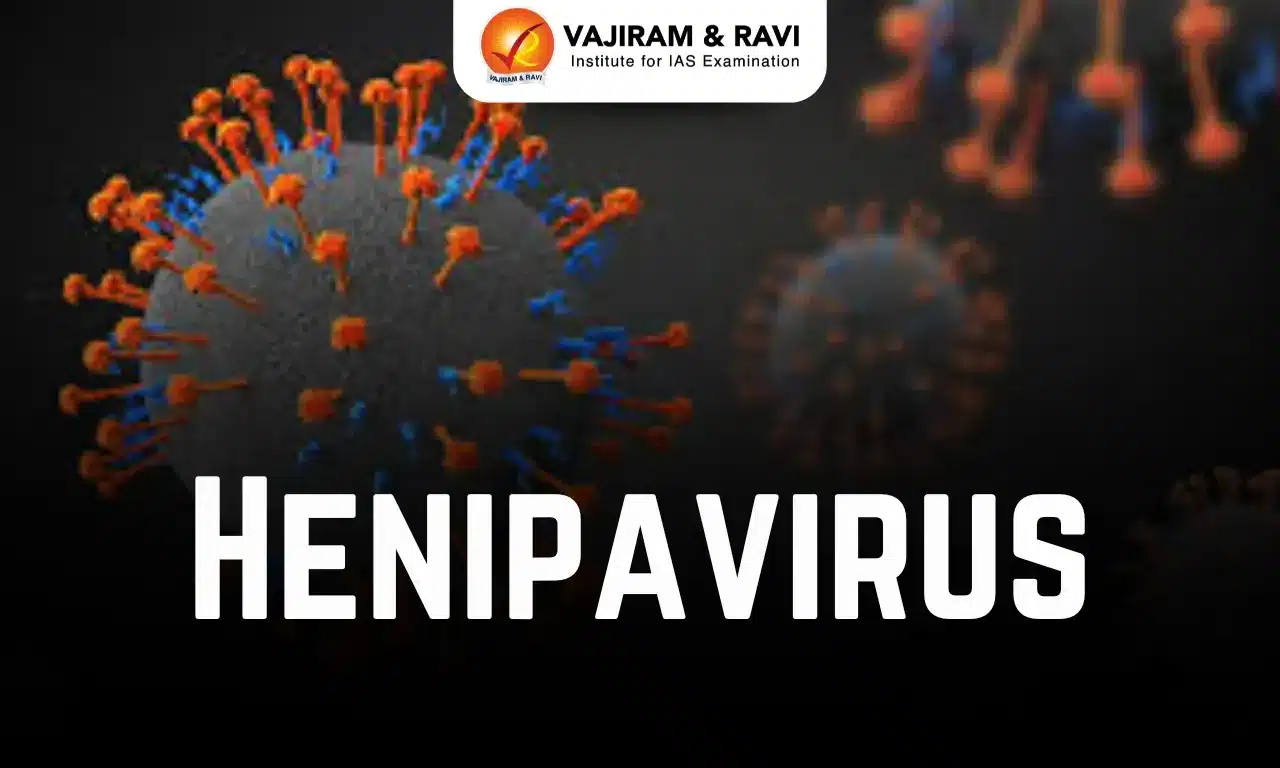Henipavirus Latest News
Camp Hill virus, a henipavirus related to Nipah, has been recently detected in North America, raising concerns of a potential outbreak.
About Henipavirus
- Henipaviruses (family Paramyxoviridae) are zoonotic, negative-sense RNA viruses.
- Fruit bats (Pteropus species, also called ‘flying foxes’) are the natural hosts of Henipaviruses.
- Henipaviruses can cross species barriers, infecting various mammals, including humans.
- They often cause severe respiratory illness and encephalitis and are associated with high case fatality rates.
- The two most notable henipaviruses are Hendra virus and Nipah virus.
- Hendra virus, first identified in Australia, has caused outbreaks with mortality rates up to 70%.
- The Nipah virus has been linked with numerous outbreaks in Southeast Asia, particularly in Malaysia and Bangladesh, with case-fatality rates estimated at 40%–75% depending on surveillance and clinical management.
- Why are henipaviruses so deadly?
- It lies in their ability to encode several proteins which block the innate immune response in infected animals and humans.
- These inhibit the cell’s response to viral infection, and allow viral replication.
Henipavirus Transmission
- Direct contact with infected animals (e.g., bats, horses, pigs).
- Consumption of contaminated food or water.
- Human-to-human transmission through bodily fluids, close contact, or respiratory droplets.
Henipavirus Symptoms
- Common symptoms include dizziness, headache, fever, and myalgias.
- However, fatality often occurs when the disease progresses to severe encephalitis and symptoms like confusion, abnormal reflexes, seizures, and coma occur.
Henipavirus Treatment
- Treatment is symptomatic, and no vaccine or antiviral drug has been developed so far to treat the disease.
Henipavirus FAQs
Q1. Is Henipavirus zoonotic?
Ans. Yes, Henipavirus is zoonotic, meaning it can be transmitted from animals to humans.
Q2. What is the incubation period of Henipavirus?
Ans. Among humans, the incubation periods are 4–20 days and 5–12 days, for Nipah and Hendra, respectively.
Q3. What does the Nipah virus do to humans?
Ans. Infection with Nipah virus can cause mild to severe disease, including encephalitis and potentially death.
Source: N18
Last updated on February, 2026
→ UPSC Notification 2026 is now out on the official website at upsconline.nic.in.
→ UPSC IFoS Notification 2026 is now out on the official website at upsconline.nic.in.
→ UPSC Calendar 2026 has been released.
→ Check out the latest UPSC Syllabus 2026 here.
→ Join Vajiram & Ravi’s Interview Guidance Programme for expert help to crack your final UPSC stage.
→ UPSC Mains Result 2025 is now out.
→ UPSC Prelims 2026 will be conducted on 24th May, 2026 & UPSC Mains 2026 will be conducted on 21st August 2026.
→ The UPSC Selection Process is of 3 stages-Prelims, Mains and Interview.
→ Prepare effectively with Vajiram & Ravi’s UPSC Prelims Test Series 2026 featuring full-length mock tests, detailed solutions, and performance analysis.
→ Enroll in Vajiram & Ravi’s UPSC Mains Test Series 2026 for structured answer writing practice, expert evaluation, and exam-oriented feedback.
→ Join Vajiram & Ravi’s Best UPSC Mentorship Program for personalized guidance, strategy planning, and one-to-one support from experienced mentors.
→ UPSC Result 2024 is released with latest UPSC Marksheet 2024. Check Now!
→ UPSC Toppers List 2024 is released now. Shakti Dubey is UPSC AIR 1 2024 Topper.
→ Also check Best UPSC Coaching in India




















